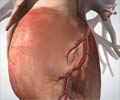A drug to knock out a key gene behind the closing of grafted artery could dramatically increase the success rate of coronary artery bypass grafts.
A drug to knock out a key gene behind the closing of grafted artery could dramatically increase the success rate of coronary artery bypass grafts.
But a procedure, developed by medical researchers from the Centre for Vascular Research in the University of New South Wales combines coronary artery bypass grafts with a new drug that “knocks out” a key gene responsible for restenosis. The technique of combining artery bypass graft has had encouraging results in operations performed on animals ahead of human trials.During surgery, the veins to be used in the bypass are soaked in the drug – known as a DNAzyme – for half-an-hour before being grafted onto the artery, bypassing the blockage.
“The DNAzyme prevents what is essentially transplant rejection,” said CVR Director and study leader Professor Levon Khachigian. “In bypass graft failure, the cells in the vein sense that they have been transplanted and react aggressively, eventually closing off the vein.
“Our ‘knockdown’ approach deliberately targets a master regulator gene responsible for the re-thickening of the vein, turning it off like a light switch which prevents the molecular mayhem it controls,” Professor Khachigian said.
A paper outlining the procedure’s success in preclinical trials appears in the prestigious Journal of Biological Chemistry.
The DNAzyme, when applied through a catheter, can also prevent restenosis after balloon angioplasty and stent surgery in animals – a procedure carried out on over 20 000 Australians each year.
Advertisement
This work was supported by grants from the National Health and Medical Research Council, the Australian Research Council and the National Heart Foundation.
Advertisement
Source-Medindia
GPL










